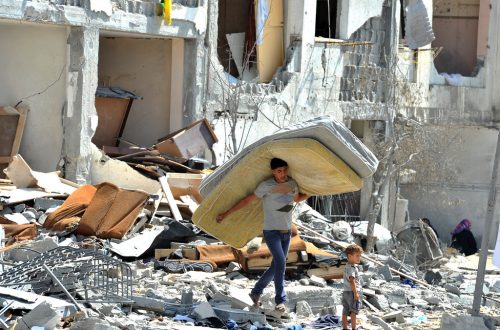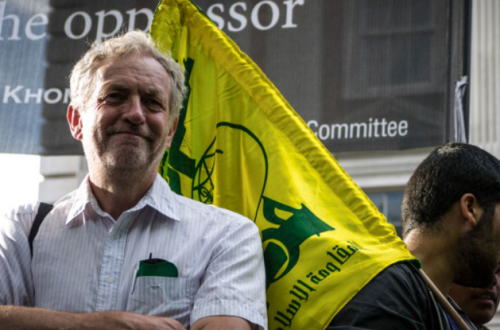This is a crosspost by Alex Hitchens. Part 1 can be read here.
In light of Moazzam Begg’s repeated statements in support of Abdullah Azzam, this blog is running a short series on the ideology of one of the last century’s most influential jihadists.
Indeed, it has become even more important to look at Azzam after today’s piece on the CagePrisoners site, in which Fahad Ansari writes:
[Gita]Sahgal has unfairly and unjustly condemned Amnesty International’s relationship with Moazzam Begg and Cageprisoners. With respect to Begg, she accuses him of standing for a “set of ideologies that support not only violence in itself but very very discriminatory behaviour, systematic discrimination against women, religious minorities, and Muslims who don’t agree with them.” What she bases this on remains a mystery.
Begg’s support for Azzam, as demonstrated here and below, should go some way toward unravelling this titanic enigma for Mr. Ansari.
Part one looked briefly at Abdullah Azzam’s explanation of defensive jihad. This post will concentrate on how he justified the use of offensive jihad as a tool of global Islamic supremacism.
In ‘The Defence of Muslim Lands’ (a text that Begg regards as a ‘magisterial discourse’ which, according to his book ‘Enemy Combatant’, was one of the best sellers at his bookshop, Maktabah al-Ansar) Azzam describes defensive jihad as a fard ayn (individual duty) that is incumbent upon all Muslims and for which no permission is required. Offensive jihad, according to Azzam, is a fard kifayah (a duty that, if performed by some, need not be performed by all):
Offensive jihad…means attacking unbelievers in their countries. When unbelievers are not mobilized to fight Muslims, jihad is a collective duty, and the least one can do is to guard the borders of the Muslim world in order to intimidate God’s enemies. For this purpose one can send out an army at least once a year. The imam may also send a unit to the land of war once or twice a year, and the population must help him; if this does not happen, it is a sin…Theologians have said: “Jihad is forced preaching [daw’ah] and it is necessary to accomplish it as much as possible, so that only Muslims or people who accept submission remain” [emphasis added] (Shirwani, Commentary, and Ibn al-Qasim, Tuhfat al-Muhtaj alal-Minhaj, 213, 9).
Although Azzam fought to oust the Soviets from Afghanistan, this was quite clearly not the only reason he took up arms. In his view, the fight in Afghanistan was only part of a long war to spread his puritanical form of Islam. As well as for defence, jihad, according to Azzam’s ‘Join the Caravan’, was also crucial as a means to “establish a solid base for the expansion of Islam”. In the section of the book on expansion, Azzam declares:
Establishing a Muslim society on an area of land is as necessary for Muslims as water and air, and this territory will exist only through an organised Islamic movement that wages jihad, in actions and words, and makes of combat its goals and its defence. The Islamic movement will be able to establish an Islamic society only through a general popular jihad.
As the title of this section suggests, Azzam is not only referring to the creation of an ‘Islamic society’ in what he deems to be Muslim lands, but rather this society should cover the entire planet. Although much debate and discussion surrounds what constitutes an ‘Islamic society’, Azzam’s definition, as explained here, is what the Taliban eventually achieved under Mullah Omar.
Just as Azzam used primary religious texts to justify defensive jihad, he applied the same justification for an offensive jihad designed to rid the entire world of unbelief. In ‘Morals and Jurisprudence of Jihad’ he quotes the following Quranic passage:
And fight them until there is no more tumult of oppression, and there prevail justice and faith in God altogether and everywhere; but if they cease, verily God does see all that they do [Quran 8:39]
Before referring to this passage, Azzam writes:
In Islam, fighting is legitimate when its aim is to spread God’s word, save humanity from unbelief, and lead humanity from the darkness of this world to its light and the light of the next life. This is why, in our holy religion, combat was established to transcend political, economic, and social obstacles to preaching the Muslim faith. It may even be said that the function of jihad s to bring down the barriers preventing this religion from spreading across the face of the earth.
Quranic interpretation is a long and complex issue, although Azzam’s own interpretation (one apparently endorsed by Begg) is clear.
Azzam can certainly be credited with helping to initiate the global jihad ideology that created al-Qaeda, although it should be noted that his vision was centred much more around conventional warfare and the use of guerrilla tactics against regular army units(such as those employed against the Soviets). It is doubtful that his vision included the use of civilian airliners as missiles or the use of women and children as bombs, and it was bin Laden and Zawahiri who took his global ideology and cultivated it into an Islamic justification for the targeting of civilians in western countries. This takes nothing away from the fact that Azzam’s beliefs were violent, sectarian, supremacist and totalitarian, and for Begg to heap praise on him while at the same time claiming to be a voice for human rights is beyond laughable. Amnesty must start looking beyond his obvious suffering at Guantanamo, and assess the risk of continuing to promote a supporter of religious fascism.
The final part of this series will look at Azzam’s take on how jihad should be carried out. Of particular interest should be his writings on the treatment of prisoners of war (hint: they make Guantanamo sound like a day out in Lego Land with the kids).


